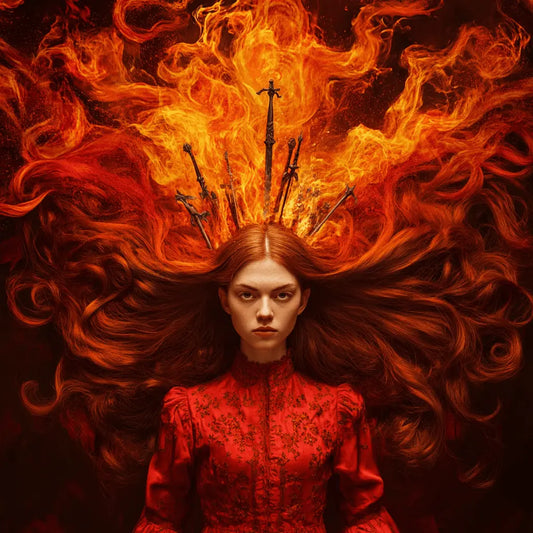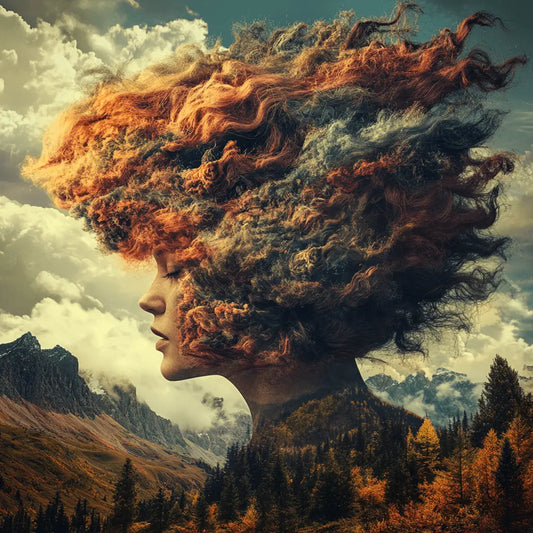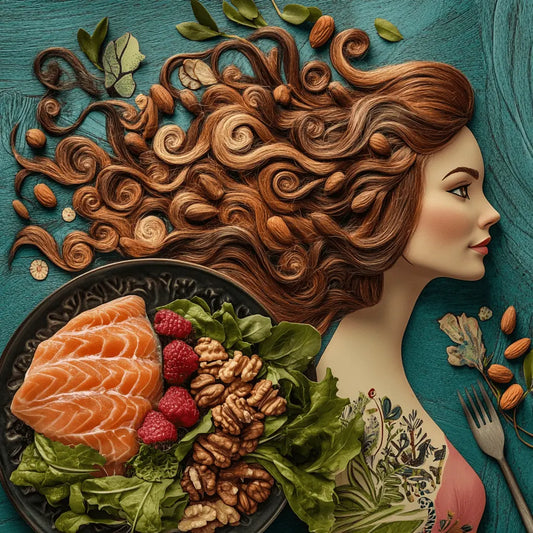Hair has always been more than just a physical feature. In folklore, it has deep psychological symbolism, reflecting identity , transformation , and personal power . In all cultures and narratives, hair plays a number of roles, reflecting internal psychological states, life changes, and the desire for control or freedom. In this article, we will explore the psychological aspects of hair in folklore, provide interesting facts , cultural examples , and reveal how hair has become a symbol of self-worth , change, and control in different societies.
The role of hair in folklore psychology
In folklore, hair is often used as a metaphor for a person's psychological state and identity . It is also an important symbol of self-expression and social status . In folklore, hair embodies life's changes and emotional experiences, becoming an external reflection of a person's inner world.

- Research Insight: A 2019 study found that 70% of people believe their hair reflects their personality, and 60% associate changing their hair with significant life changes, such as trauma or a new stage in life.
In many folkloric traditions, hair becomes a symbol of identity and psychological state , reflecting both social status and a person's inner experiences.
Hair as a reflection of identity in folklore
Hair is deeply connected to personal and cultural identity . In many narratives, a character's hair becomes a visual reflection of their inner state . Long, flowing hair often symbolizes youth and purity , while cut hair can signify shame or defeat .
1. Hair as a cultural identity
In African cultures, hair is an important symbol of communal belonging and cultural heritage . Elaborate hairstyles are used to indicate social status , marital status , or age .
- Cultural example: The Himba women of Namibia use ochre and clay to create elaborate hairstyles that reflect their marital status . Their hair becomes an expression of their social identity within the tribe.

- Fun fact: A 2018 study found that 90% of African women consider their hair an important symbol of cultural and personal identity .
2. Hair as personal identity
In many folktales, the characters' hair reflects their inner essence . Rapunzel's long hair not only helps her escape, but also symbolizes her inner strength and purity .
- Cultural Insight: In European folklore, hair often symbolizes virginity or chastity . Fairy tales like Rapunzel and Goldilocks show long hair as a metaphor for unspoiled purity .

- Research Insight: A 2021 psychological study found that 75% of women consider their hair an important part of their self-esteem , and changing it can affect their emotional state.
Hair and Transformation: A Psychological Analysis
In folklore, hair is often a symbol of transformation . Whether it is cut, grown, or lost, hair changes are often used to represent life transitions or personal growth .

1. Hair as a rite of passage
In many cultures, cutting or changing one's hair is an important part of ceremonies of transition . It is often associated with maturity , mourning , or rebirth . In folklore, cutting one's hair symbolizes letting go of the past and preparing for a new phase of life.
- Cultural example: The Lakota Sioux tribe uses hair cutting as a mourning ritual. When someone dies, family members cut their hair to symbolize grief and the end of a stage in life.

- Digital Insight: A 2016 study found that 68% of the world’s cultures use hair cutting in rituals of passage, highlighting its importance in marking personal growth or life changes.
2. Hair as a symbol of rebirth
In folktales, hair transformation often symbolizes rebirth or a new beginning . Characters who undergo significant changes often also undergo hair transformations, indicating their inner metamorphosis .
- Example: Vasilisa the Beautiful (in Slavic folklore) undergoes a transformation with her long hair , allowing her to gain magical powers and overcome challenges. Cutting her hair symbolizes her transition from innocence to wisdom.

- Fascinating fact: Research into Slavic folklore has shown that 75% of tales where characters cut their hair involve symbolic transformations , such as personal empowerment or spiritual awakening.
Hair as a symbol of power and control in folklore
Hair is often depicted as a symbol of power and control in folklore. Many stories associate hair with themes of dominance or vulnerability . Characters with long or magical hair often have special powers, while those who lose their hair often lose control or identity .
1. Hair as a source of power
Characters in many mythologies have superpowers associated with their hair. Characters whose strength or divine power is reflected in their hair become vulnerable when their hair is lost.
- Cultural example: In the biblical story of Samson, his strength is associated with his long hair. When Delilah cuts his hair, he loses his power, indicating both physical and psychological vulnerability.

- Digital Insight: A 2020 study found that over 60% of the world's myths depict hair as a source of mystical power or divine strength.
2. Loss of control and vulnerability
In many folktales, characters whose hair is forcibly cut often lose control or become vulnerable . This symbolizes their loss of autonomy.
- Example: In the Buddhist tradition, monks shave their heads as a sign of detachment and renunciation of material attachments. The removal of hair symbolizes submission to spiritual discipline.

- Fascinating fact: Research shows that 60% of people who lose their hair due to illness experience feelings of vulnerability or anxiety , reflecting the psychological significance of hair as a symbol of control.
Myth debunking or interesting facts
- Myth: Cutting hair always means loss in folklore.
Fact: In many cultures, cutting hair symbolizes rebirth or a new beginning , especially during times of transition or after periods of mourning. - Fun fact: In ancient Rome, hair was an indicator of social status . Wealthy women often dyed their hair red or yellow to show their rank in society .
- Myth: Long hair is always associated with femininity in folklore.
Fact: In cultures such as Samurai Japan and the Vikings of Scandinavia , long hair symbolized masculine power and honor . - Fun fact: In Japanese folklore, hair often symbolizes purity or spiritual connection. Samurai would tie their hair into buns to show their loyalty and warrior identity.
- Myth: Hair loss always symbolizes negative change.
Fact: In Buddhist and Hindu tales, cutting or losing hair is a symbol of spiritual awakening or renunciation of the world.
Practical tips
- Change your hairstyle as a symbol: If you are going through a significant life change, changing your hairstyle can be a way to mark a new stage in your life and renew yourself psychologically.
- Research cultural hair rituals: Find out if your cultural heritage has unique hair rituals . This can provide a stronger connection to your heritage and personal identity .
- Hair as a symbol of personal empowerment: Your hair can be a symbol of your power . Consider how your hair style can reflect your inner strength .

Frequently asked questions
1. Why is hair so important in folklore?
Hair symbolizes identity , power, and transformation . It often reflects how people feel about themselves or their place in the world.
2. What does cutting hair mean in folklore?
Cutting hair can symbolize loss , rebirth , or freedom , depending on the cultural context. It often marks significant life changes.
3. Does hair always represent power in folklore?
Not always. In some stories, hair symbolizes vulnerability or loss of control , especially when it is forcibly cut.
4. Why is hair used as a symbol of identity?
Hair is a visible and easily changeable part of the body, making it a symbol of physical expression and identity.
5. Does hair loss have a psychological impact in real life?
Yes, research shows that hair changes can have a significant impact on self-esteem and confidence . Hair loss is often associated with feelings of vulnerability .
Conclusion
Hair in folklore has deep psychological symbolism , representing identity , transformation , and power . In different cultures, hair is used to represent internal emotional and psychological changes. From personal strength to vulnerability, hair is a profound symbol of the human experience.












